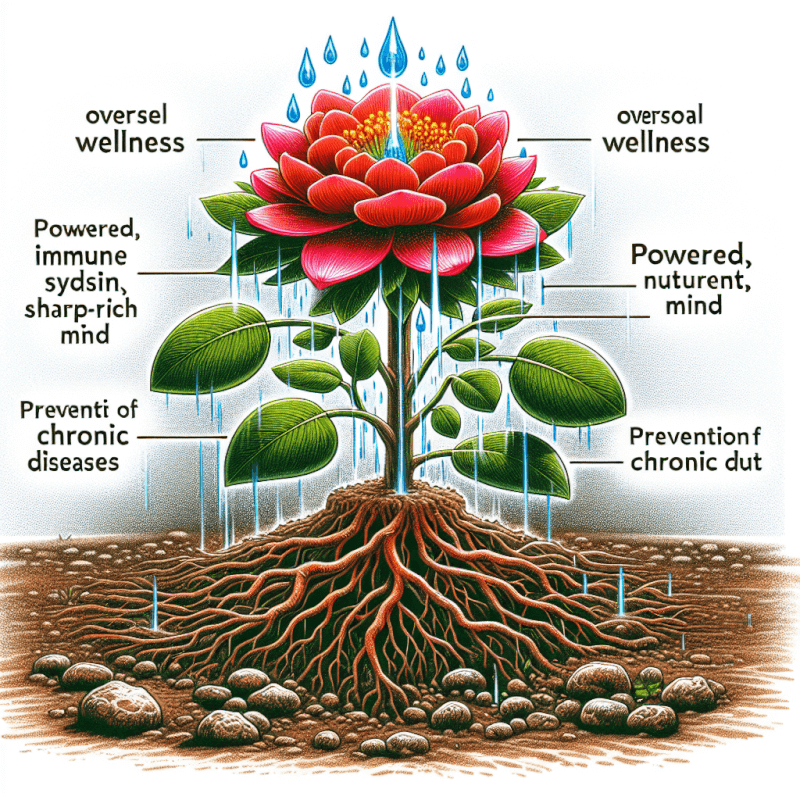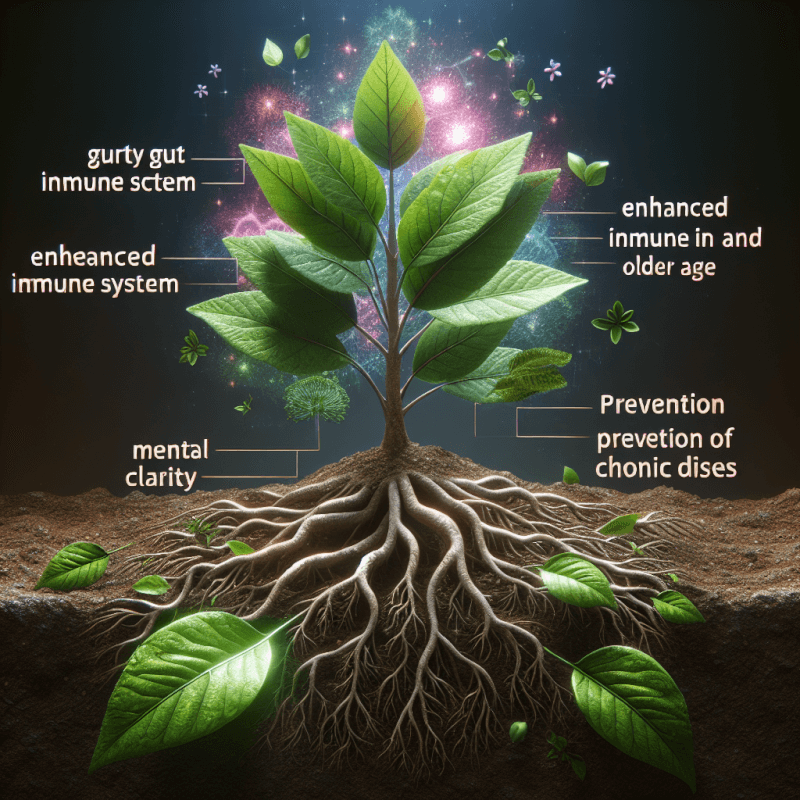As you age, it becomes increasingly important to prioritize your gut health for improved overall wellness. The condition of your gut plays a significant role in various aspects of your well-being, such as digestion, immune function, and even mental health. In this article, we will explore the fascinating connection between gut health and aging, and how maintaining a healthy gut can lead to better overall health outcomes as you grow older. So, grab a cup of tea and get ready to discover the secrets to a thriving gut and a vibrant life in your golden years.
Digestive Health
Role of the gut
The gut, also known as the gastrointestinal tract, plays a vital role in our overall health and well-being. It is responsible for the digestion and absorption of nutrients from the food we consume. In addition, the gut is home to trillions of microorganisms, collectively known as the gut microbiota, which have a profound influence on various aspects of our health, including our immune function, metabolism, and mental well-being.
Changes in the gut with age
As we age, several changes occur in the gut that can impact its function. The most notable change is a decrease in the diversity and abundance of the gut microbiota, leading to an imbalance known as dysbiosis. This dysbiosis can result in a decline in the gut’s ability to effectively digest and absorb nutrients, potentially leading to malnutrition or deficiencies. Moreover, aging can also affect the motility of the gut, resulting in constipation or other digestive disorders.
Digestive disorders
Age-related changes in the gut can make older adults more susceptible to various digestive disorders. These may include conditions such as gastroesophageal reflux disease (GERD), peptic ulcers, irritable bowel syndrome (IBS), and inflammatory bowel disease (IBD). Digestive disorders can cause discomfort, pain, and disrupt daily activities. Managing these disorders is essential for maintaining good digestive health and overall wellness in older age.
Impact on overall wellness
Maintaining a healthy gut is crucial for overall wellness, especially as we age. The gut influences numerous aspects of our health, including nutrient absorption, immune function, inflammation, mental health, and even medication interactions. Poor digestive health can lead to malnutrition, weakened immune function, chronic inflammation, cognitive decline, and an increased risk of chronic diseases. Therefore, taking care of your gut health is essential for promoting overall wellness in older age.
Nutrient Absorption
Importance of nutrient absorption
Nutrients obtained from the food we eat are crucial for sustaining life and maintaining optimal health. The gut plays a vital role in the digestion and absorption of these nutrients, allowing them to enter the bloodstream and be utilized by the body. Adequate nutrient absorption is essential for energy production, tissue repair, immune response, and various other physiological functions.
Age-related changes in nutrient absorption
With advancing age, the gut undergoes certain changes that can impair the absorption of nutrients. The decrease in gut motility can result in slowed transit time, leading to reduced absorption of water and nutrients. Additionally, age-related changes in the stomach acid production and pancreatic enzymes can negatively affect the breakdown and absorption of proteins, vitamins, and minerals. These age-related changes can contribute to nutrient deficiencies and malnutrition in older adults.
Consequences of poor nutrient absorption
Poor nutrient absorption can have significant consequences for overall health, particularly in older age. It can contribute to malnutrition, which can lead to muscle wasting, weakness, immune dysfunction, and impaired wound healing. Deficiencies in essential vitamins and minerals can result in various health problems, such as anemia, cognitive decline, and increased susceptibility to infections. Addressing and correcting poor nutrient absorption is essential for maintaining optimal health and well-being in older adults.

Immune Function
Gut microbiota and immune system
The gut microbiota plays a crucial role in the development and regulation of the immune system. The gut is home to a vast array of microorganisms that help educate and train our immune cells, ensuring an appropriate immune response to foreign substances. The gut microbiota produces various metabolites and compounds that modulate immune function, promoting a balanced and effective immune response.
Age-related changes in gut microbiota
As we age, the composition and diversity of the gut microbiota undergo significant changes. This age-related dysbiosis can lead to an imbalance in the immune system, resulting in a decrease in immune function. The decline in beneficial bacteria and the overgrowth of harmful bacteria can impair the immune response, making older adults more susceptible to infections, autoimmune diseases, and chronic inflammation.
Effects on immune function
The gut microbiota has a profound influence on immune function. It helps maintain the integrity of the gut lining, preventing the entry of harmful pathogens into the bloodstream. Additionally, the gut microbiota promotes the development of immune cells and modulates their activity, ensuring a balanced immune response. Imbalances in the gut microbiota can disrupt these processes, leading to immune dysfunction and increased susceptibility to various diseases.
Association with chronic diseases
The gut microbiota and immune system play a critical role in the development and progression of chronic diseases, including cardiovascular disease, diabetes, and certain types of cancer. Age-related changes in the gut microbiota and immune function can contribute to chronic inflammation, insulin resistance, and other factors that promote the development of these diseases. Maintaining a healthy gut and a balanced immune system is crucial for reducing the risk of chronic diseases and promoting overall wellness in older age.
Inflammation
Role of gut in inflammation
The gut and inflammation are closely interconnected. The gut lining acts as a barrier, preventing the entry of harmful bacteria, toxins, and other foreign substances into the bloodstream. When the gut lining becomes compromised, these substances can pass through, triggering an immune response and leading to inflammation. Chronic inflammation in the gut can have widespread effects on the body, contributing to the development and progression of various diseases.
Chronic low-grade inflammation in older age
In older age, there is a tendency for chronic low-grade inflammation, often referred to as inflammaging. Age-related changes in the gut, such as dysbiosis and increased gut permeability, can contribute to this chronic inflammation. Inflammaging is associated with an increased risk of chronic diseases, including cardiovascular disease, diabetes, neurodegenerative diseases, and certain cancers. Managing gut health and reducing inflammation is essential for promoting healthy aging and overall wellness.
Consequences of chronic inflammation
Chronic inflammation can have detrimental effects on overall health and well-being. It can contribute to tissue damage, impaired organ function, and the development of chronic diseases. Additionally, chronic inflammation has been linked to cognitive decline, depression, and other mental health disorders. Managing and reducing chronic inflammation through promoting a healthy gut can help improve overall health and reduce the risk of age-related diseases.
Link between gut health and inflammation
The gut microbiota and the health of the gut lining play a crucial role in regulating inflammation. A healthy and diverse gut microbiota helps maintain the integrity of the gut lining, preventing the entry of harmful substances and reducing systemic inflammation. On the other hand, dysbiosis and gut permeability can lead to increased inflammation. Taking steps to support a healthy gut, such as consuming a balanced diet, avoiding inflammatory foods, and potentially using probiotics, can help reduce inflammation and promote better overall wellness.

Mental Health
Gut-brain axis
The gut-brain axis is a bidirectional communication pathway between the gut and the brain. The gut and the brain are interconnected through various mechanisms, including the nervous system, immune system, and the gut microbiota. This communication plays a crucial role in maintaining mental well-being and cognitive function.
Effect of gut health on mental well-being
The gut has a significant impact on mental well-being. The gut microbiota produces neurotransmitters, such as serotonin and gamma-aminobutyric acid (GABA), which play a role in regulating mood, sleep, and stress response. Imbalances in the gut microbiota can disrupt the production of these neurotransmitters, potentially leading to mental health disorders such as depression and anxiety. Additionally, chronic inflammation originating from the gut can also contribute to mental health issues.
Association with cognitive decline
The health of the gut and the gut microbiota has been implicated in cognitive decline and neurodegenerative diseases, such as Alzheimer’s disease. Age-related changes in the gut, including dysbiosis and increased gut permeability, can contribute to systemic inflammation and the production of neurotoxins, potentially damaging brain cells and impairing cognitive function. Maintaining a healthy gut through a balanced diet, exercise, and potentially probiotic supplementation may help support cognitive health in older age.
Potential therapeutic interventions
Promoting gut health can be a potential therapeutic intervention for improving mental well-being in older adults. Strategies such as consuming a diet rich in fiber, fruits, and vegetables, managing stress levels, engaging in regular physical activity, and practicing good sleep hygiene can positively impact gut health and mental well-being. Additionally, probiotics and prebiotics have shown promise in promoting mental health, with certain strains of probiotics demonstrating mood-enhancing effects. However, further research is needed to better understand the specific mechanisms and establish optimal therapeutic interventions for mental health and cognitive decline.
Medication Interactions
Impact of medications on gut health
Certain medications can have adverse effects on gut health. Antibiotics, while necessary for treating infections, can disrupt the delicate balance of the gut microbiota, leading to dysbiosis. Nonsteroidal anti-inflammatory drugs (NSAIDs) can damage the gut lining, increasing the risk of ulcers and gastrointestinal bleeding. Some medications, such as proton pump inhibitors (PPIs) and laxatives, can alter gut motility and affect nutrient absorption. Understanding the potential impact of medications on gut health is essential for optimizing overall wellness in older age.
Common medications that affect the gut
Several commonly used medications can have an impact on gut health. Antibiotics, as mentioned earlier, can disrupt the gut microbiota. NSAIDs, commonly used for pain relief, can cause irritation and damage to the gut lining. PPIs, used to reduce stomach acid, can affect the gut’s ability to break down and absorb nutrients properly. Additionally, certain medications used for managing chronic conditions, such as diabetes or hypertension, can have gastrointestinal side effects that impact gut health.
Consequences for overall wellness
The adverse effects of medications on gut health can have significant consequences for overall wellness. Disruption of the gut microbiota can lead to dysbiosis, impaired immune function, and increased susceptibility to infections. Damage to the gut lining can result in gastrointestinal symptoms, such as heartburn, ulcers, or diarrhea. Altered gut motility and nutrient absorption can contribute to malnutrition or deficiencies. Therefore, it is crucial for older adults to be aware of these potential medication interactions and work closely with healthcare professionals to minimize their impact on gut health.

Digestive Symptoms
Common digestive symptoms in older age
In older age, various digestive symptoms may arise. These can include heartburn, indigestion, bloating, constipation, diarrhea, and changes in appetite. These symptoms can be caused by age-related changes in gut function, such as reduced gut motility or decreased production of digestive enzymes. Additionally, underlying digestive disorders, medications, and dietary factors can contribute to these symptoms.
Impact on quality of life
Digestive symptoms can significantly impact the quality of life for older adults. They can cause discomfort, pain, and affect daily activities and social interactions. Digestive symptoms can lead to decreased appetite, which may result in malnutrition or weight loss. Furthermore, digestive symptoms can contribute to fatigue, sleep disturbances, and reduced overall well-being. Prompt evaluation, diagnosis, and management of digestive symptoms are vital for improving the quality of life in older adults.
Prevention and management strategies
Prevention and management strategies can help alleviate digestive symptoms and promote better gut health. Maintaining a balanced diet that includes fiber-rich foods, whole grains, fruits, and vegetables can support proper digestion and bowel regularity. Staying hydrated and engaging in regular physical activity can also aid in maintaining healthy digestion. Managing stress levels through relaxation techniques, such as meditation or deep breathing exercises, can help reduce the risk of stress-related digestive symptoms. Additionally, avoiding trigger foods and seeking medical advice when symptoms persist is essential for proper diagnosis and appropriate treatment.
Probiotics and Prebiotics
Role of probiotics and prebiotics in gut health
Probiotics are beneficial bacteria that can help restore and maintain a healthy balance in the gut microbiota. They can improve gut motility, support the integrity of the gut lining, and enhance immune function. Prebiotics, on the other hand, are non-digestible fibers that serve as food for beneficial bacteria in the gut, promoting their growth and activity. Together, probiotics and prebiotics can have a positive impact on gut health and overall well-being.
Benefits for older adults
Probiotics and prebiotics offer several benefits for older adults. They can help alleviate digestive symptoms such as bloating, constipation, and diarrhea. Probiotics have also shown potential in reducing the risk of antibiotic-associated diarrhea, a common issue in the elderly population. Additionally, probiotics and prebiotics can help improve immune function, reduce inflammation, and potentially enhance mental well-being. However, it is important to note that individual responses to probiotics and prebiotics can vary, and it is best to consult a healthcare professional for personalized recommendations.
Administration and potential risks
Probiotics and prebiotics can be obtained through dietary sources or as supplements. Yogurt, kefir, sauerkraut, and certain fermented foods are rich in probiotics. Prebiotics can be found in foods such as garlic, onions, bananas, and whole grains. When considering supplements, it is important to choose reputable brands and follow the recommended dosage. It is also crucial to be aware of any potential risks or allergies associated with specific strains of probiotics or types of prebiotics. Any concerns should be discussed with a healthcare professional.
Recommended sources and dosage
When incorporating probiotics and prebiotics into the diet, it is advisable to consume a variety of fermented foods rich in probiotics, while also ensuring an adequate intake of prebiotic fibers. The specific strains and dosage of probiotics may vary depending on individual needs and health conditions. It is advisable to consult with a healthcare professional or a registered dietitian to determine the most appropriate sources and dosages for optimal gut health.

Dietary Factors
Effect of diet on gut health
Diet plays a crucial role in maintaining a healthy gut. A balanced diet that includes a variety of whole foods, fiber-rich fruits and vegetables, lean proteins, and healthy fats can support a diverse and beneficial gut microbiota. Fiber, in particular, is important for promoting bowel regularity and maintaining gut health. On the other hand, diets high in processed foods, added sugars, unhealthy fats, and lacking in fiber can contribute to dysbiosis and compromised gut health.
Key nutrients for maintaining gut health
Several key nutrients are essential for maintaining gut health. Fiber is essential for promoting proper digestion and bowel regularity. Omega-3 fatty acids, found in fatty fish, walnuts, and flaxseeds, have anti-inflammatory properties and can support a healthy gut lining. Antioxidants from fruits and vegetables help reduce oxidative stress and inflammation in the gut. Additionally, consuming sufficient protein, vitamins, and minerals is important for supporting the immune system and overall gut function.
Recommended dietary changes for older adults
For older adults aiming to maintain or improve gut health, certain dietary changes can be beneficial. Increasing fiber intake by consuming whole grains, legumes, fruits, and vegetables can support bowel regularity and promote a healthy gut microbiota. Prioritizing omega-3 fatty acids from sources such as fatty fish, chia seeds, and walnuts can help reduce inflammation in the gut. Consuming a variety of colorful fruits and vegetables can provide a rich source of antioxidants for gut health. Finally, consulting with a healthcare professional or a registered dietitian for personalized recommendations considering any underlying health conditions or medication interactions is advisable.
Lifestyle Factors
Exercise and gut health
Regular physical activity has been shown to have a positive impact on gut health. Exercise can help improve gut motility, reducing the risk of constipation and promoting regular bowel movements. Additionally, exercise has been found to have anti-inflammatory effects, which can benefit gut health by reducing chronic inflammation. Engaging in aerobic exercise, strength training, or even activities such as walking can contribute to better gut health and overall wellness.
Stress management and gut health
The gut is highly sensitive to stress, and chronic stress can negatively impact gut health. Stress can alter gut motility, increase gut permeability, and disrupt the gut microbiota, potentially leading to digestive symptoms and inflammation. Finding effective stress management techniques, such as relaxation exercises, meditation, or engaging in enjoyable hobbies, can help promote a healthy gut. Seeking support from healthcare professionals or mental health practitioners may also be beneficial in managing stress-related gut issues.
Sleep and gut health
Quality sleep is essential for optimal gut health. Chronic sleep deprivation or poor sleep quality can disrupt the gut microbiota, impair gut motility, and contribute to inflammation. Adequate sleep supports the production and release of hormones involved in appetite regulation and metabolism, influencing gut health. Establishing good sleep hygiene practices, such as maintaining a consistent sleep schedule, creating a relaxing bedtime routine, and ensuring a comfortable sleep environment, can contribute to better gut health and overall well-being.
Smoking and alcohol consumption
Smoking and excessive alcohol consumption can have detrimental effects on gut health. Smoking has been linked to an increased risk of digestive disorders, such as peptic ulcers, gastric cancer, and inflammatory bowel disease. It can also disrupt the balance of the gut microbiota, contributing to dysbiosis. Similarly, excessive alcohol consumption can damage the gut lining and impair gut function. Minimizing or quitting smoking, as well as consuming alcohol in moderation, is important for maintaining a healthy gut and promoting overall wellness in older age.
In summary, gut health plays a crucial role in overall wellness in older age. The gut influences various aspects of health, including nutrient absorption, immune function, inflammation, mental health, medication interactions, and the occurrence of digestive symptoms. Age-related changes in the gut can disrupt these processes, leading to complications and an increased risk of chronic diseases. However, with proper understanding and proactive measures, such as maintaining a balanced diet, regular exercise, stress management, and paying attention to medication interactions, it is possible to promote and maintain a healthy gut for optimal well-being in older age.



